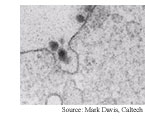
TRN Video Shelf
Select science and technology documentaries
Select science and technology documentaries
 |
 |
 |
 |


| Research Roundup |
| September 13, 2013 |
| Smartphone knows your touch |
| Fingerprint recognition isn’t the only way for your smartphone to be sure it’s really you without bothering you for a passcode. A set of machine learning algorithms lets a phone identify you from the way you swipe and poke it. |
| DNA makes graphene transistors |
| A nifty process aligns DNA strands on a silicon chip and then forms narrow strips of graphene. The graphene is narrow enough to form usable transistors, opening a route to ultra-fast, ultra-efficient computer circuits. |
| Robotic skin could augment humans |
| University of Tokyo researchers are applying their robotic skin, which consists of pressure and temperature sensors, to the human body to serve as health monitors and prosthetics. The team has been working on the technology for the better part of a decade (see Give it some skin, TRN, August 22, 2005). |
Features
 Nano
cancer drugs move to the next level: humans
Nano
cancer drugs move to the next level: humansA growing number of cancer therapies packaged in infinitesimal particles are making their way to patients.
Can nanotech beat cancer?
Cancer will always be with us in some form, but the fear and devastation it causes could be history within a generation. We'll have the tiniest of things to thank for it.
View from the High Ground
Email conversations with researchers in high places.
How It Works
Get the nitty-gritty on nanotechnology, biochips, self-assembly, DNA technologies, quantum cryptography, and more.
|
||
